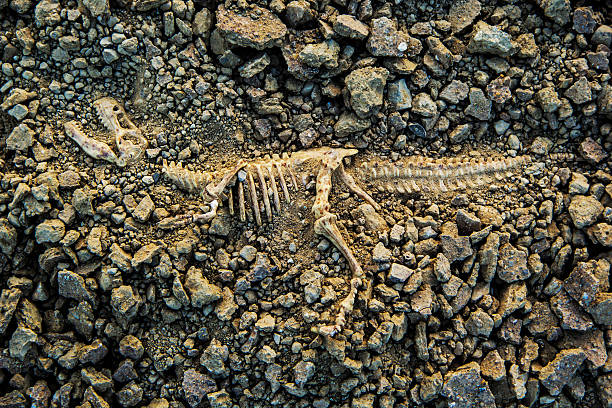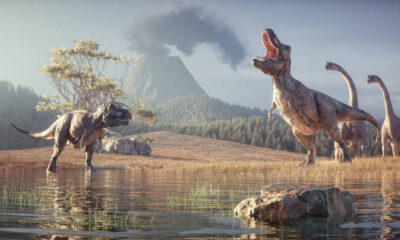Education
How Did Dinosaurs Really Go Into Extinction

The extinction of the dinosaurs is one of the most intriguing mysteries in Earth’s history, captivating scientists and curious minds alike for decades. While there is no definitive answer to what caused the demise of these magnificent creatures that once roamed the planet, several theories have been proposed and studied extensively. In this article, we will explore some of the leading hypotheses regarding the extinction of the dinosaurs.
1. Impact Event:
One of the most widely accepted theories is the impact event hypothesis. This theory suggests that a massive asteroid or comet collided with Earth approximately 66 million years ago, leading to catastrophic environmental changes. The impact would have released immense amounts of dust and debris into the atmosphere, causing a global winter-like effect known as an impact winter. The resulting darkness and cold would have disrupted ecosystems, leading to widespread extinction of plant and animal species, including the dinosaurs.
Support for this theory comes from the discovery of the Chicxulub crater in the Yucatan Peninsula, Mexico, which is believed to be the remains of the impact site. Evidence of an iridium-rich layer, which is commonly associated with extraterrestrial impacts, has been found in sedimentary rock layers dating back to the time of the dinosaur extinction.
2. Volcanic Activity:
Another hypothesis suggests that massive volcanic activity, particularly the eruption of the Deccan Traps in present-day India, played a significant role in the extinction event. The eruption of these volcanoes would have released vast amounts of greenhouse gases, such as carbon dioxide and sulfur dioxide, into the atmosphere, leading to global climate change and environmental disturbances.
The intense volcanic activity would have triggered widespread wildfires, acid rain, and toxic gas emissions, further disrupting ecosystems and contributing to the decline of numerous species. While the timing of the Deccan Traps eruptions coincides with the dinosaur extinction, it is still debated whether volcanic activity alone was sufficient to cause their demise or if it acted in conjunction with other factors.
3. Climate Change:
Changes in climate, either due to external factors like impact events or internal factors like volcanic activity, are believed to have played a significant role in the extinction of the dinosaurs. The impact winter caused by an asteroid or comet collision would have led to a rapid cooling of the planet, disrupting normal climatic patterns and triggering a series of chain reactions in ecosystems.
The sudden drop in temperatures would have affected food availability, migration patterns, and reproductive cycles of plant and animal species, putting immense pressure on their survival. Dinosaurs, with their large body sizes and specialized dietary requirements, may have been especially vulnerable to these rapid environmental changes. As their food sources declined and habitats became inhospitable, many dinosaur species struggled to adapt and ultimately perished.
4. Disease and Parasites:
Some researchers propose that diseases and parasites might have also played a role in the extinction of the dinosaurs. As ecosystems were disrupted and species populations declined, it is possible that diseases spread more easily among vulnerable populations, leading to widespread illness and reduced reproductive success. Additionally, parasites could have further weakened already stressed populations, contributing to the overall decline of dinosaur species.
5. Competition and Evolutionary Factors:
Finally, competition with other species and evolutionary factors cannot be overlooked when considering the extinction of the dinosaurs. The rise of new species and the evolution of existing ones could have outcompeted dinosaurs for limited resources, further straining their ability to survive in changing environments. Additionally, the dinosaurs’ lack of adaptability and specialization in specific niches may have limited their ability to withstand the challenges presented by the changing world.
In conclusion, the extinction of the dinosaurs was likely the result of a combination of factors, rather than a single event or cause. While the impact event hypothesis and volcanic activity remain prominent theories, it is probable that a convergence of environmental, climatic, biological, and geological factors contributed to the downfall of these iconic creatures. The study of dinosaur extinction continues to be a fascinating and ever-evolving field of research, shedding light on Earth’s past and the interconnectedness of life on our planet.
-

 Breaking News3 years ago
Breaking News3 years agoBREAKING: CBN Redesigns Naira Notes
-

 Breaking News2 years ago
Breaking News2 years agoBREAKING: Tinubu Considers Temporary Subsidy On Petrol
-

 Breaking News2 years ago
Breaking News2 years agoJUST IN: Gbajabiamila Dies In UK
-

 News3 years ago
News3 years agoDrama As Church Gives Certificate Of Virginity To Ladies After Testing Them (See Photos)
-

 Crime4 years ago
Crime4 years agoUproar As Student Teacher On Teaching Practice Impregnates 24 Girls, Headmistress, Four Female Teachers
-

 Breaking News10 months ago
Breaking News10 months agoJUST IN : Sacked Osun LG Chairman Killed Few Minutes After Returning To Office
-

 Breaking News2 years ago
Breaking News2 years agoBREAKING: Dangote Speaks As BUA Reduces Price Of Cement
-

 Crime3 years ago
Crime3 years agoJUST IN: Gunmen Storm Osogbo, Kill Man, Daughter Few Hours After His Wife Put To Bed (Photos)






